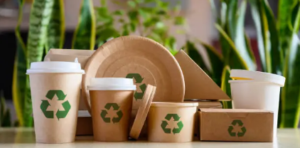Plant-based packaging is a sustainable alternative to traditional plastics. Using plant-based materials reduces waste and carbon emissions. It also helps to create a regenerative circular economy.
Using plant-based packaging can boost brand image and attract environmentally conscious consumers. It can also help brands remain compliant with regulatory authorities. For more information about the plant-based packaging benefits, click here.
Unlike traditional plastics, plant-based products break down into microorganisms and return to the soil, where they belong. They can also be recycled.
Eco-friendly
 Plant-based packaging is a sustainable alternative to traditional plastic bags. It is biodegradable and compostable, reducing the world’s dependence on fossil fuels and GHG emissions. It also reduces the amount of waste in landfills and oceans. It can be made from various renewable biological sources, including cellulose film packaging, corn starch, potato films, and seaweed.
Plant-based packaging is a sustainable alternative to traditional plastic bags. It is biodegradable and compostable, reducing the world’s dependence on fossil fuels and GHG emissions. It also reduces the amount of waste in landfills and oceans. It can be made from various renewable biological sources, including cellulose film packaging, corn starch, potato films, and seaweed.
Choosing plant-based products and packaging is a great way to align your brand with eco-conscious consumers. It reduces your ecological footprint and signals a shift to a circular economy prioritising natural resources. It also promotes responsible sourcing and certifications, making it a more credible brand choice for your customers.
Biodegradable
Unlike traditional plastic packaging, plant-based packaging is biodegradable and can be composted. It also does not require fossil fuels to manufacture, which is good for the environment. It can package a wide range of products, including beverages and foods. Its versatility makes it a viable option for businesses in multiple industries.
Eco-friendly packaging also appeals to consumers increasingly focused on sustainability and green issues. Its use can improve a brand’s reputation and generate customer loyalty. In addition, it can reduce waste and lower methane emissions.
Moreover, this type of packaging is free from chemicals of concern, such as BPAs and phthalates, so it does not leach into food or drink. It also complies with strict FDA regulations on materials that contain food. These materials must undergo a premarket notification process and pass critical safety points. In addition, they must be free from heavy metals and volatile organic compounds. They must also be tested for their ability to prevent microbial growth and moisture loss.
Compostable
Unlike traditional plastics, plant-based packaging breaks down into organic matter and is entirely harmless to the environment. It reduces waste accumulation, helping combat the global garbage crisis. Additionally, compostable plant-based packaging uses renewable resources and contributes to carbon sequestration. Moreover, it is free of chemicals of concern, such as BPAs and phthalates.
Plant-based packaging is made from various natural biological materials, such as mushrooms, corn starch, and food waste. These materials are harvested and processed to meet functional requirements, including barrier properties, strength, and longevity. Educating consumers about the eco-friendly attributes of plant-based packaging encourages responsible disposal and helps shift to a circular economy. For more information about the plant-based packaging benefits, click here.
The best way to educate consumers is through clear labelling and transparency. This way, consumers can make informed decisions about their purchasing and disposal habits. Moreover, these packaging materials can also protect products and maintain freshness while enduring shipping. That makes them ideal for beverages and other consumer packaged goods.
Recyclable
As consumers become more aware of the ecological repercussions of conventional plastic packaging, companies are increasingly turning to plant-based alternatives. This shift is a response to growing consumer demand for eco-friendly products and a desire to support the development of a sustainable economy.
Unlike their fossil-fuel counterparts, plant-based materials leave a lower carbon footprint throughout their lifecycle. In addition, they require fewer chemicals during production. As a result, they reduce greenhouse gas emissions and align with global climate goals.
In addition, plant-based packaging is made from renewable natural resources. It is also compostable. It is particularly important in the restaurant industry, where disposable plates and utensils are often landfill waste. Compostable packaging can help reduce this waste and the risk of food contamination.
Using plant-based materials in product packaging is a growing trend, driven by the need for more sustainable options and stricter government regulations on plastic waste. These alternatives are crafted from renewable sources such as sugarcane, cornstarch, and food crops. They can be made into flexible film, paper, and other packaging products to replace traditional plastics.

